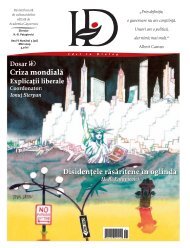Sensul vietii - Ecleziastul, Kant, Nietzsche, Tzara - CADI
Sensul vietii - Ecleziastul, Kant, Nietzsche, Tzara - CADI
Sensul vietii - Ecleziastul, Kant, Nietzsche, Tzara - CADI
Create successful ePaper yourself
Turn your PDF publications into a flip-book with our unique Google optimized e-Paper software.
elsewhere, when things are considered in broad perspective, a strange, unexpected pattern in<br />
human affairs reveals itself, one in which almost everything is paradoxical. A greater degree of<br />
civil freedom seems advantageous to a people’s spiritual freedom; yet the former established<br />
impassable boundaries for the latter; conversely, a lesser degree of civil freedom provides<br />
enough room for all fully to expand their abilities. Thus, once nature has removed the hard shell<br />
from this kernel for which she has most fondly cared, namely, the inclination to and vocation<br />
for free thinking, the kernel gradually reacts on a people’s mentality (whereby they become<br />
increasingly able to act freely), and it finally even influences the principles of government,<br />
which finds that it can profit by treating men, who are now more than machines, in accord with<br />
their dignity. <br />
Footnotes<br />
Sapere aude means literally "Dare to be wise." Horace (Epist. I,2,40). If you're so inclined, you<br />
can read the original in Latin and English translation. ↩<br />
Caesar non est supra grammaticos means "Caesar is not superior to the grammarians."<br />
AudioLatinProverbs.com has some background, if you're interested. ↩<br />
Frederich II of Prussia<br />
Friedrich <strong>Nietzsche</strong> - Twilight of the Idols iii (extras)<br />
PROBLEM OF SOCRATES<br />
1<br />
Concerning life, the wisest men of all ages have judged alike: it is no good. Always and<br />
everywhere one has heard the same sound from their mouths--a sound full of doubt, full of<br />
melancholy, full of weariness of life, full of resistance to life. Even Socrates said, as he died: "To<br />
live--that means to be sick a long time: I owe Asclepius the Savior a rooster." Even Socrates was<br />
tired of it. What does that evidence? What does it evince? Formerly one would have said (--oh,<br />
it has been said, and loud enough, and especially by our pessimists): "At least something of all<br />
this must be true! The consensus of the sages evidences the truth." Shall we still talk like that<br />
today? May we? "At least something must be sick here," we retort. These wisest men of all<br />
ages--they should first be scrutinized closely. Were they all perhaps shaky on their legs? late?<br />
tottery? decadents? Could it be that wisdom appears on earth as a raven, inspired by a little<br />
whiff of carrion?<br />
2<br />
The consensus of the sages proves least of all that they were right in what they agreed on: it<br />
shows rather that they themselves, these wisest men, agreed in some physiological respect,<br />
and hence adopted the same negative attitude to life--had to adopt it. Judgments, judgments of<br />
value, concerning life, for it or against it, can, in the end, never be true: they have value only as<br />
symptoms, they are worthy of consideration only as symptoms; in themselves such judgments<br />
are stupidities. One must by all means stretch out one's fingers and make the attempt to grasp<br />
this amazing finesse, that the value of life cannot be estimated. Not by the living, for they are<br />
an interested party, even a bone of contention, and not judges; not by the dead, for a different<br />
reason. For a philosopher to see a problem in the value of life is thus an objection to him, a



